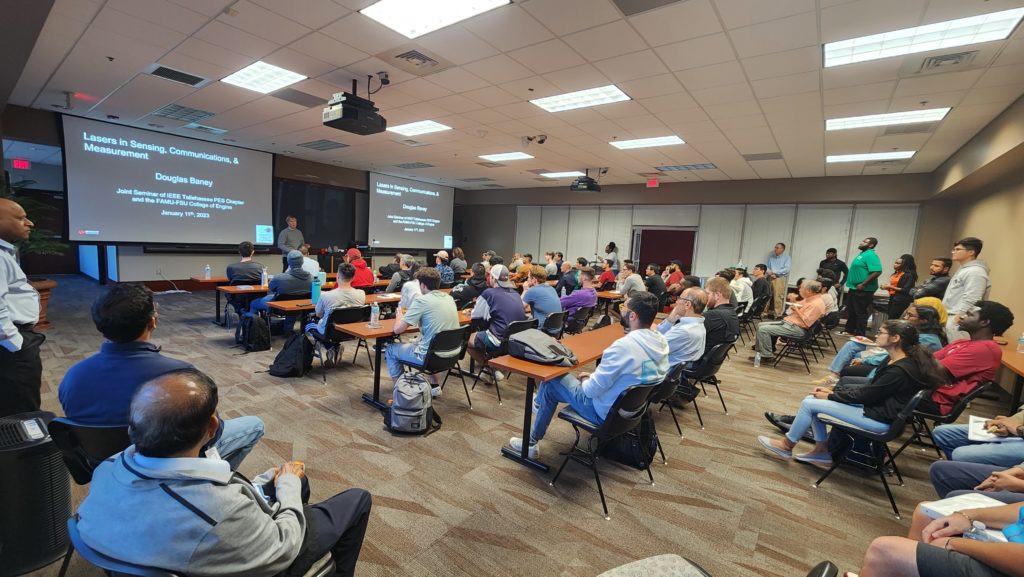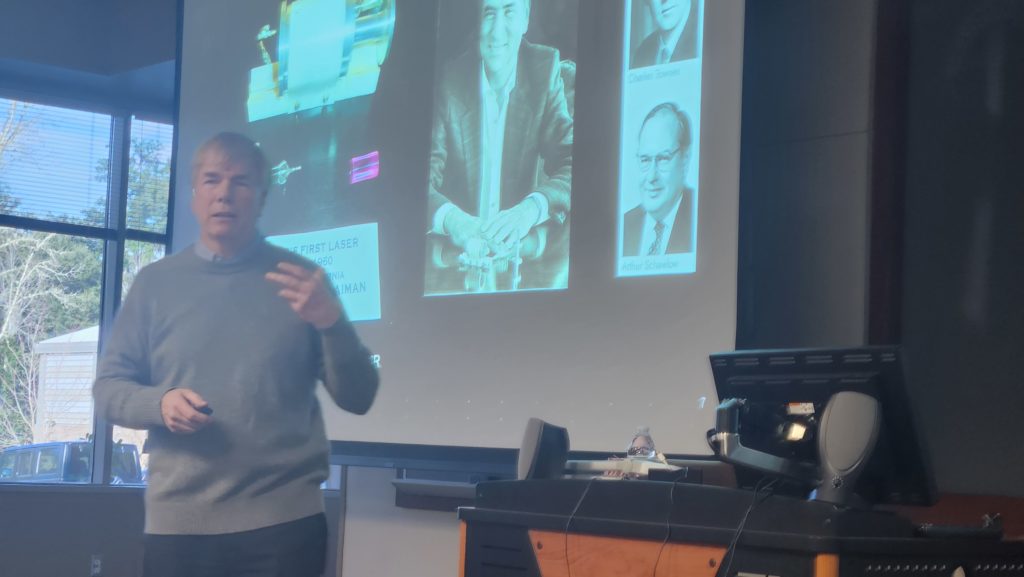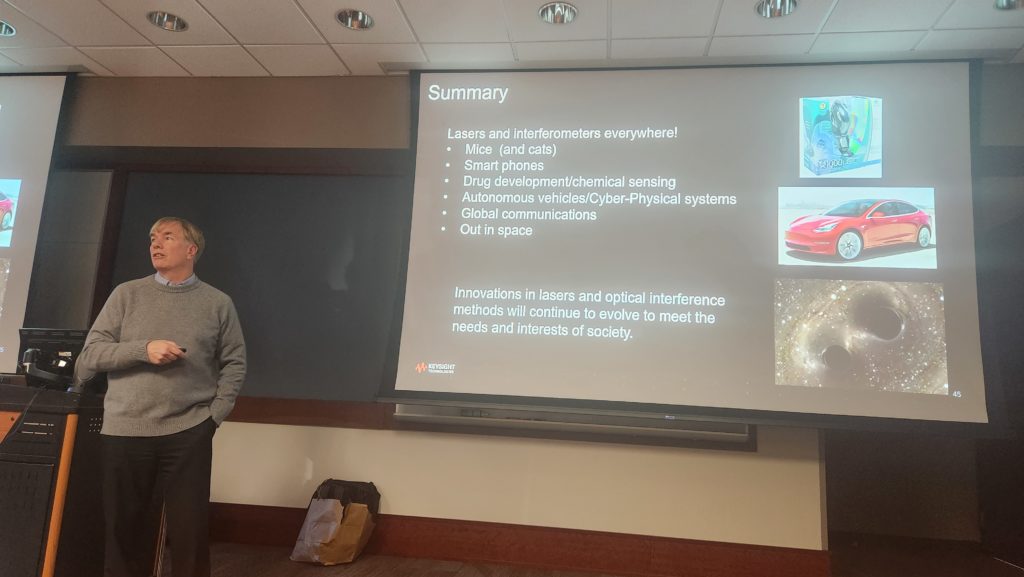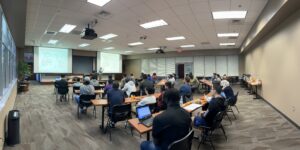2023 Fall Graduate Student Presentation Awards
Event: IEEE Section and PES Chapter Sponsored Graduate Student Presentation Awards
When: November 7, 2023, from 11 am to 1:30 pm
Attendees: Graduate students and faculty
Presenters: Four students, nominated by faculty, presented
Winners: Three students won the award
- Lifang Yi – $300 (first prize) – IEEE PES Chapter Award
- Xuanchen Xiang – $200 (second prize) – IEEE Tallahassee Section Award
- Xiaofeng Dong – $200 (second prize) – IEEE Tallahassee Section Award
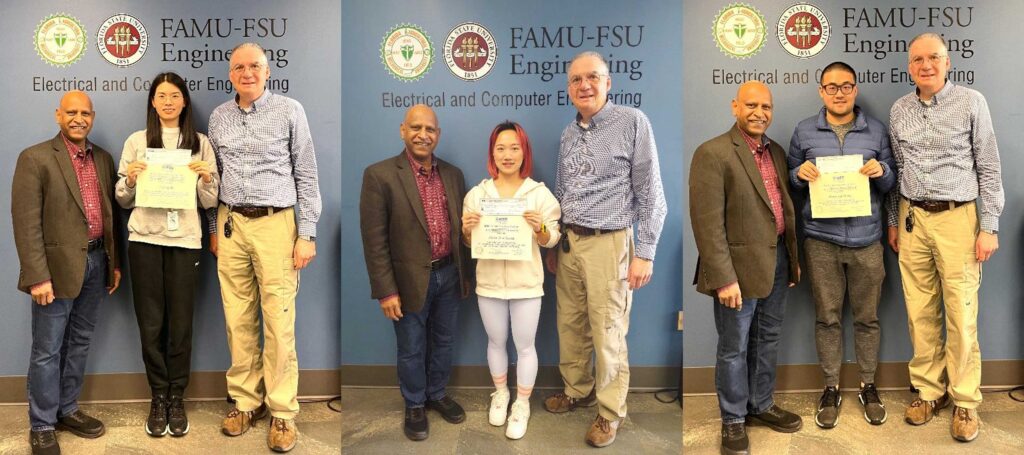
Estimation and control of underwater optical wireless communication systems
Presenter: Dr. Ibrahima N’Doye, Electrical Engineering Department at King Abdullah University of Science and Technology
Time: 15:00 – 16:30, Monday, June 5, 2023
Location: Room 120, Center for Advanced Power Systems
Abstract
Underwater optical wireless communication (UOWC) technologies are essential for the growth of future underwater communication applications. As the demand for capacity increases, UOWC is considered an emerging alternative technology in the underwater communication area. However, maintaining a controlled line-of-sight link between transmitter and receiver is a significant challenge because the alignment angle required for trajectory tracking control is not directly measured and has to be estimated. In this talk, I will present our recent works on estimating the alignment angle between autonomous underwater vehicles. Specifically, I will discuss a novel estimation-based trajectory control algorithm for a light-emitting-diode (LED)-based optical communication model. Then, I will discuss localization and tracking control of a mobile target ship with an autonomous underwater vehicle (AUV) in the underwater environment. The framework uses a hybrid acoustic-optical underwater communication to drive the AUV to the maximum achievable data rate angle. The acoustic link is used for the non-line-of-sight localization, and the optical link is for the line-of-sight transmission. I will conclude the talk by providing a perspective on the potential impact of designing distributed cooperative control systems for exploring seafloor and monitoring underwater engineering applications.
Biography
Dr. Ibrahima N’Doye is a Research Scientist with the Electrical Engineering Department at King Abdullah University of Science and Technology (KAUST). He jointly received his Ph.D. degree in Automatic Control from the Research Center of Automatic Control, University of Lorraine (CRAN-CNRS), France, and his Ph.D. degree in Control Systems and Industrial Informatics from the University Hassan II Ain Chock, Morocco, in 2011. He was a Postdoctoral Researcher with the Faculty of Science, University of Luxembourg, Luxembourg, and the King Abdullah University of Science and Technology. His main research interests include estimation, control theory, and networked control systems. He is a recipient of the IEEE Senior Member grade in 2020. He is an Associate Editor for the Proceedings of The Institution of Mechanical Engineers, Part I: Journal of Systems and Control Engineering (JSCE). He is the Co-organizer and Chairman of the open track invited session of the 2023 IFAC World Congress and Chairman of the sessions “Observers for nonlinear systems” and “Sensor fusion” of the 2023 American Control Conference.

Dr. Ibrahima N’Doye



====================================
My Professional Journey!
Presenter: Dr. Manoj R. Shah
Time: 15:00 – 16:30, Monday, May 22, 2023
Location: Room 120, Center for Advanced Power Systems
Abstract:
This presentation will be a “fly over” through my 34+ years of professional (technical and academic) journey. I will highlight the variety of topics/subjects I dealt with as an electrical engineer and how one learns to work with a multidisciplinary mindset solving complex and challenging problems while learning key elements of other technical areas such as mechanical (structures & dynamics), material – metallic (magnetic & non-magnetic), & non-metallics – insulation and composites, thermal + fluid dynamics, system integration, customer specifications/constraints, applicable standards, and so on.
Bio:
Dr. Manoj R. Shah is a Life Fellow of IEEE (2016) and a member of the National Academy of Engineering (2022). He received B.Tech. from Indian Institute of Technology, Kharagpur, India and MSEE & PhD from Virginia Polytechnic Institute and State University, Blacksburg, VA. He is presently a consultant to General Electric Aerospace Research (GEAR) in Advanced Electric Machines. He served as a Professor of Practice at Rensselaer Polytechnic Institute (RPI) Troy, New York from 2017 to 2021. Prior to that he worked as Principal Engineer at General Electric Global Research Center (GE-GRC) from 1999 to 2016 until retiring and various GE businesses from 1981 to 1999. Before joining GE, he spent 16 months as a postdoctoral research fellow at Rensselaer Polytechnic Institute, Troy, NY. After completing research work for his PhD, he worked for Westinghouse Electric Company, Pittsburgh, PA, from 1978 to 1980. He received the IEEE-IAS’s Gerald B. Kliman Innovation award (2015) & IEEE’s Nikola Tesla award (2012), GE-Research’s Coolidge Fellowship award (2012), and GE-Power’s Outstanding Achievement award (1991). He has authored or co-authored 90 US (mostly in the electric machines and systems area) and many foreign patents along with over 50 technical publications; some receiving prize paper awards. He is a consultant to GE Aviation Research, GEAR.
 Dr. Manoj Shah
Dr. Manoj Shah
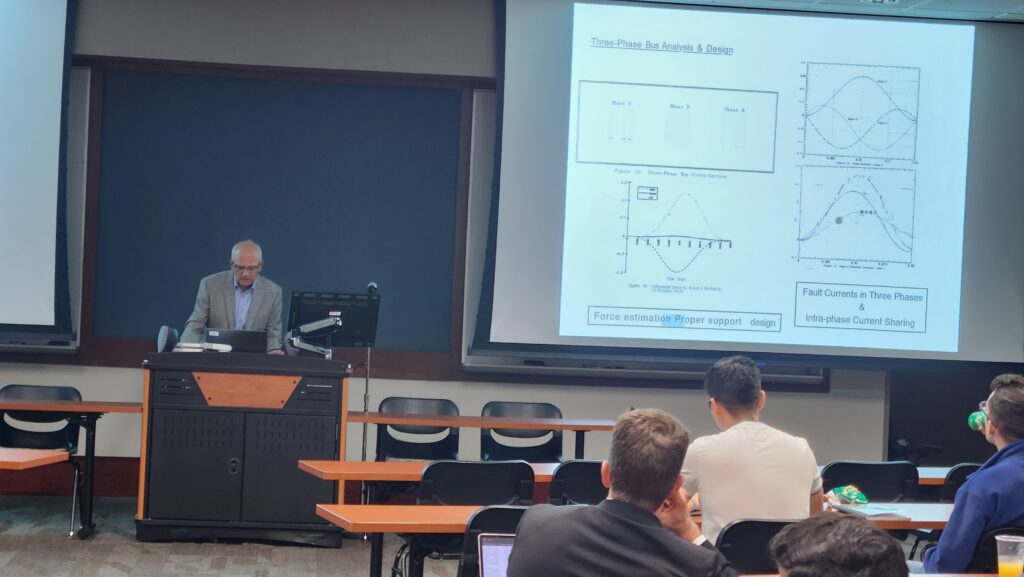
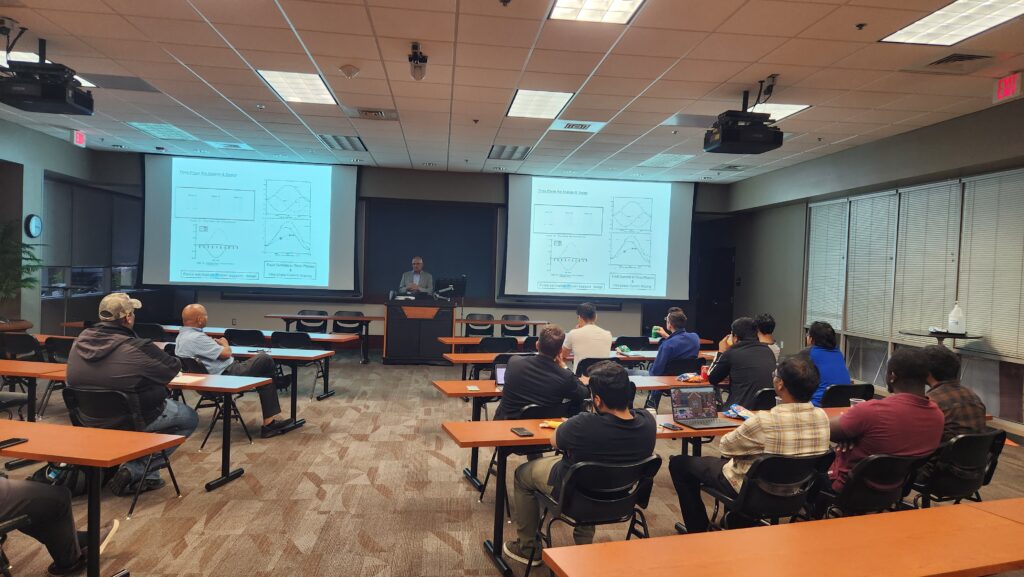
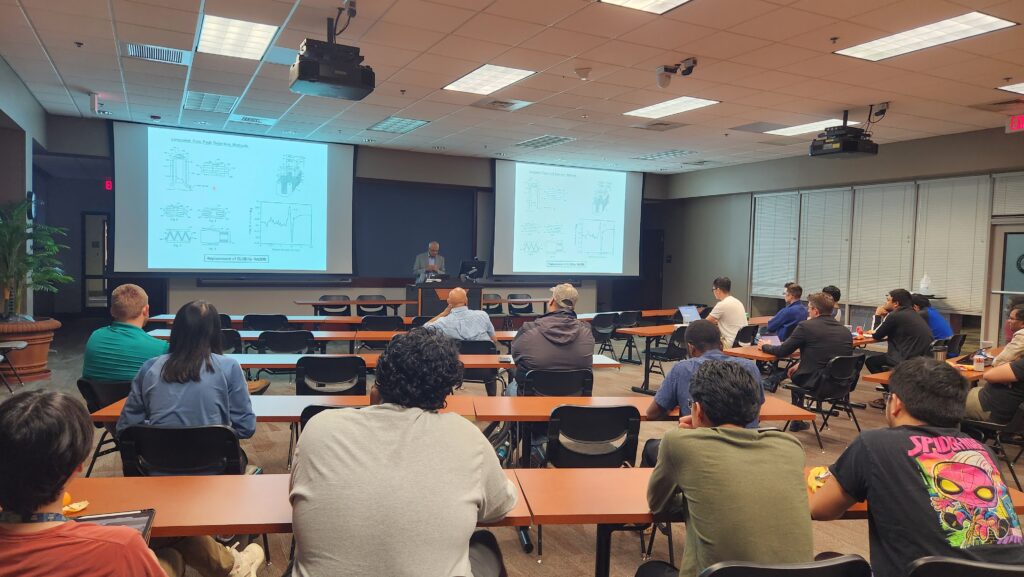
=================================
Title: Power Grid Security, Resilience, and Reliability: Challenges & Approaches
Presenter: Tuyen (Tony) Vu, Ph.D., Coulter School of Engineering, Clarkson University
Time: 15:30 – 16:30, Thursday, April 13, 2023
Presenter: Tuyen (Tony) Vu, Ph.D., Coulter School of Engineering, Clarkson UniversityLocation: Room Time: 15:30 – 16:30, Thursday, April 13, 2023120, Center for Advanced Power Systems
Abstract: Power grids are transitioning to renewable energy sources, with an estimated 44% of electrical energy (by 2050) in the US coming from renewable sources (> 80% from solar & wind). This transition, by necessity, brings higher levels of digitization in communication and controls. Millions of smart monitoring-and-control devices such as smart meters, phasor measurement units (PMU)) and power generation monitors are being integrated into power grids to increase system situational awareness for optimal control actions. While this modernization for smart measurements, controls, and communication could empower grid operators through faster and more accurate system situational awareness, the distributed nature of IoT devices makes grids vulnerable to widespread cyber threats. Notable examples in cyber-physical systems include the cyber-attacks on the Ukrainian power system, the Colonial pipeline, and the SolarWinds software provider.
In addition to ensuring grid security, there is a comparable level of focus on integrating large inverter-based resource plants (IBRs) like offshore wind (OSW). OSW has become increasingly attractive as an alternative resource for achieving decarbonization goals because the estimated levelized cost of OSW projects has decreased significantly (50% in 2020 compared to 2014). To incorporate multi-GWs OSW plants, large wind turbines (10-20MW) must be deployed. With hundreds of OSW projects in the interconnection pipeline, tens of thousands of wind turbines will be connected to the power grids. However, the high concentrations and penetrations of IBR pose unprecedented challenges to the reliability and resilience of the transmission grids, particularly with regard to control instability, which can cause unit tripping and blackouts due to weak grid voltage fluctuations resulting from contingencies and faults caused by extreme weather or man-made events.
In this talk, three key areas related to the future of power grids will be discussed: Security, Resilience, and Reliability. Firstly, the talk will cover security challenges and advanced monitoring solutions to improve situational awareness in power grids. Next, the focus will shift to controls for energy services systems that can remain resilient even under fault or attack conditions. Finally, the talk will present a case study of a reliable power system with high IBR penetration, specifically offshore wind. The presentation will conclude by discussing research trends related to these three aspects of power grids, particularly in light of the increasing cyber-physical threats and the integration of high-IBRs.
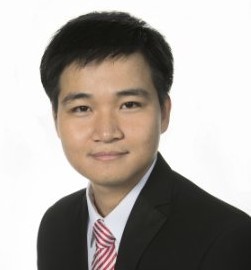
Bio: Tony Tuyen Vu (PhD, PE) received his BS in electrical engineering from Hanoi University of Science Technology, Vietnam, and his Ph.D. in electrical engineering from Florida State University in 2016. From 2016 to 2017, he was a postdoctoral research associate at the Florida State University-Center for Advanced Power Systems (FSU-CAPS). From 2017 to 2018, he was a Research Faculty at the same research center. Since July 2018, he has been an Assistant Professor at Clarkson University, NY, USA. He is also an affiliate faculty at FSU-CAPS. His areas of interest include smart grid; power system dynamics, stability, and control; energy management and optimization; power systems cybersecurity, and integration of distributed energy resources into power systems. He was a guest editor of IEEE Transactions on Industrial Informatics in Feb 2020 for the Special issue on Resilience, Reliability, and Security in Cyber-Physical Systems. He has also chaired and co-chaired sessions of IEEE conferences such as IEEE IECON and IEEE ESTS conferences. Dr. Vu has collaborated with colleagues in academic institutions, national labs, and industries. His research has been funded by NSF, ONR, DOE, and NYSERDA. His work boasts over 70 international publications. He received the first-prize paper award from the IEEE Industrial Electronics Magazine in 2021.


================================================
Joint Technical Seminar of Tallahassee IEEE PES Chapter
FAMU-FSU College of Engineering, and The Center for Advanced Power Systems
Modelling, Dynamics and Control of Aggregate Load Models
Presenter: Dr. Ian Hiskens, Vennema Professor of Engineering, Department of Electrical Engineering and Computer Science, University of Michigan
Time: 15:30 – 16:30, Thursday, March 30, 2023
Location: Room 120, Center for Advanced Power Systems
Abstract: Analysis, simulation and control of large populations (ensembles) of small loads is achieved using aggregate load models. Aggregation of loads that operate according to hysteresis controls, for example thermostatically controlled loads (TCLs) such as residential air-conditioners and heat pumps, is of particular interest. So-called bin models form the basis for such load aggregation. The presentation will consider the accuracy and fidelity of bin models. Focusing on residential air-conditioners, it will explore bin model extensions that cater for temperature delay and multi-zone interactions. Various load ensemble control strategies are prone to undesirable, highly nonlinear forms of behaviour including synchronization, sustained oscillations and bifurcations. The nature of such dynamic behaviour will be explored and the implications for controller design will be considered.
Bio: Ian A. Hiskens is the Vennema Professor of Engineering in the Department of Electrical Engineering and Computer Science, University of Michigan, Ann Arbor. He has held prior appointments with the Queensland electricity supply industry, and various universities in Australia and the United States. His research interests lie at the intersection of power system analysis and systems theory, with recent activity focused largely on integration of renewable generation and controllable loads. Dr. Hiskens is involved in numerous IEEE activities in the Power and Energy Society, Control Systems Society, Circuits and Systems Society and Smart Grid Initiative, and has served as VP-Finance of the IEEE Systems Council. He is a member of the Editorial Board of the Proceedings of the IEEE. He is a Fellow of IEEE and a Fellow of Engineers Australia. Dr. Hiskens is a Chartered Professional Engineer in Australia, and the 2020 recipient of the M.A. Sargent Medal from Engineers Australia.
Dr. Ian Hiskens, University of Michigan
=======================================
Architectures, Topologies and Components for High-Frequency, High-Density Power Conversion
Joint Technical Seminar of Tallahassee IEEE PES Chapter
FAMU-FSU College of Engineering, and
The Center for Advanced Power Systems
Time: 15:30 – 16:30, Thursday, March 9, 2023
Location: Room 120, Center for Advanced Power Systems
Title: Architectures, Topologies and Components for High-Frequency, High-Density Power Conversion
Presenter: David Perreault, Ford Foundation Professor of Engineering, Massachusetts Institute of Technology
Refreshments will be served.
Abstract
Magnetic components, including inductors and transformers, are often the largest contributors to the size and loss of power converters, and can be a key limiting factor in achieving improved performance. This talk describes emerging approaches in the design of power electronics that seek to address the twin challenges of miniaturization and performance. Improved energy-storage components are one key approach to advancing the performance of power electronic systems. Likewise, architectures and topologies that minimize magnetic energy storage and/or utilize it more flexibly can overcome magnetic component limitations, leading to smaller, higher-performance systems. Designs operating at greatly increased frequencies can also facilitate miniaturization and improved bandwidth and can enable new applications of power electronics. This talk will outline opportunities provided by such approaches and provide examples of their use to achieve higher-performance power electronic systems.
David Perreault
David Perreault received the B.S. degree from Boston University and the S.M. and Ph.D. degrees from the Massachusetts Institute of Technology, all in Electrical Engineering. He is presently the Ford Professor of Engineering at MIT. His research interests include design, manufacturing, and control techniques for power electronic systems and components, and in their use in a wide range of applications. Dr. Perreault is a Member of the National Academy of Engineering, a Fellow of the IEEE and is the recipient of numerous awards including the IEEE R. David Middlebrook Achievement Award for his work in power electronics. He is co-author of fifteen IEEE prize papers in the area, and of the second edition of the textbook “Principles of Power Electronics,” to be released by Cambridge University Press in 2023. Dr. Perreault also co-founded startup companies Eta Devices (acquired by Nokia in 2016) and Eta Wireless (acquired by Murata in 2021). 
Dr. David Perreault, Massachusetts Institute of Technology
=======================
Microgrids as a Resiliency Source
Time: 3 PM on February 13, 2023
Venue: Center for Advanced Power Systems, Research Foundation Building A, Seminar Room 120, 2000 Levy Avenue, Tallahassee, Florida 32310
Abstract
Traditional distribution system engineering is not developed to handle extreme events. The same is true for widely adopted distribution system reliability indices. New methodology and metrics are needed to provide resilience and sustain critical services following catastrophic outages. To this end, microgrids can serve as a resiliency source for the distribution system hosting the microgrids. In this presentation, the role of microgrids as a resiliency source will be discussed. In addition to serving critical load in the distribution system, microgrids can provide black start power for the transmission system. In an islanded mode without support from the utility system, a microgrid needs to be able to maintain stability with respect to disturbances. As a cyber-physical system, the dynamic performance of a microgrid depends on the communication latency as well as the data acquisition cycle time. In the future grids with high penetration of renewable and energy storage facilities, microgrids play a critical role in supporting operation and control of the transmission and distribution systems.
Presenter: Chen-Ching Liu, Ph.D.
Chen-Ching Liu is American Electric Power Professor and Director, Power and Energy Center, at Virginia Tech. During 1983-2017, he was on the faculty of University of Washington, Iowa State University, University College Dublin (Ireland), and Washington State University. Professor Liu received an IEEE Third Millennium Medal in 2000 and the Power and Energy Society Outstanding Power Engineering Educator Award in 2004. In 2013, Dr. Liu received a Doctor Honoris Causa from Polytechnic University of Bucharest, Romania. He chaired the IEEE Power and Energy Society Fellow Committee, Technical Committee on Power System Analysis, Computing and Economics, and Outstanding Power Engineering Educator Award Committee. Professor Liu is the U.S. Representative on the CIGRE Study Committee D2 – Information Systems and Telecommunication. He was elected a Fellow of the IEEE, Member of Virginia Academy of Science, Engineering, and Medicine, and Member of the U.S. National Academy of Engineering.
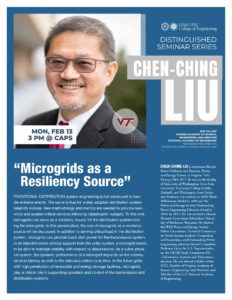
Chen-Ching Liu, Ph.D.
===========================================
IEEE PES Chapter Student Focused Event
Conversations with Graduate Students with Dr. Chen Ching Liu
Time: 4 – 5 PM on February 13, 2023
Venue: Center for Advanced Power Systems, Research Foundation Building A, Seminar Room 120, 2000 Levy Avenue, Tallahassee, Florida 32310
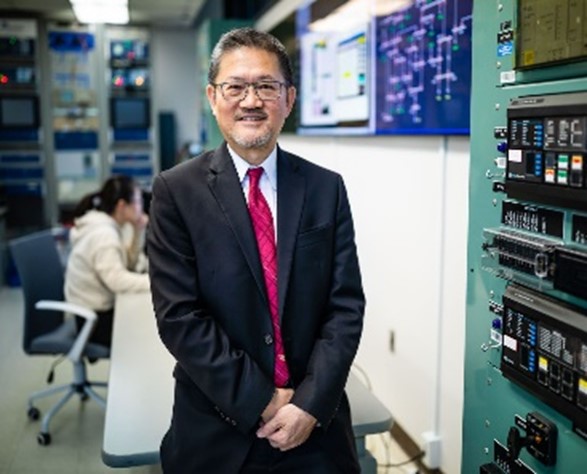
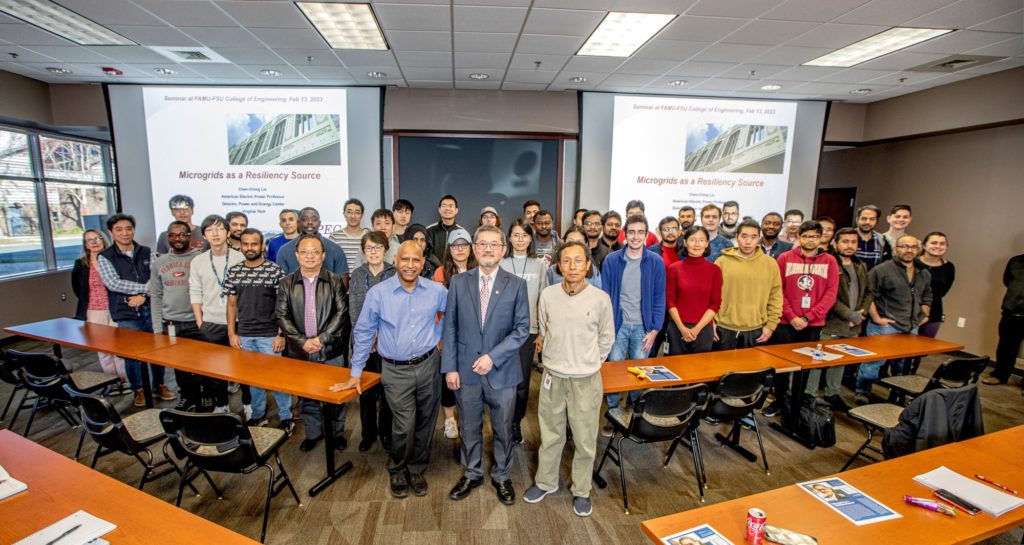
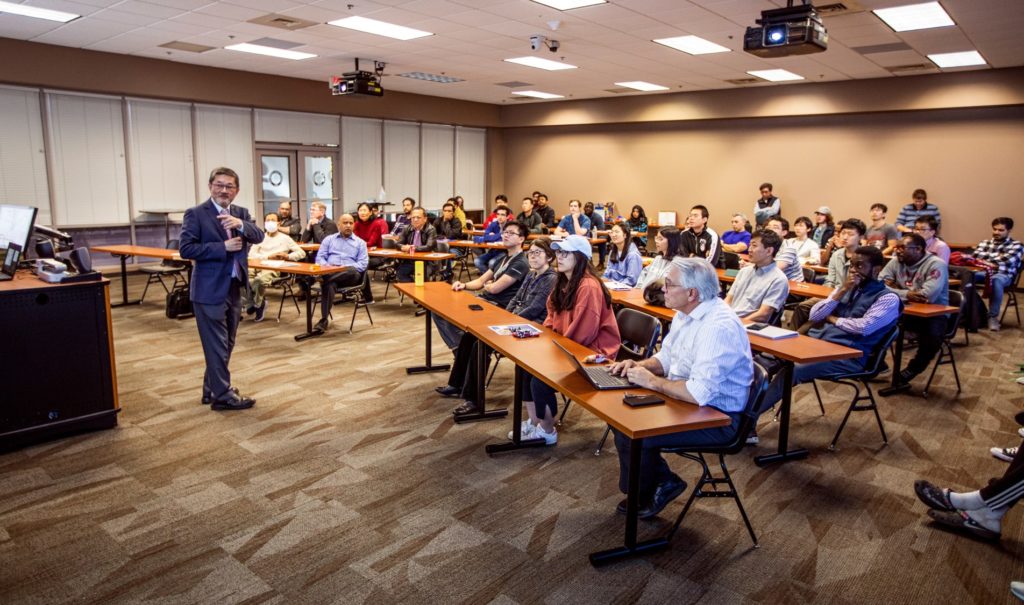
================================
Electric Utility Industry – Perspectives and Challenges
Joint Technical Seminar of Tallahassee IEEE PES Chapter
and The Center for Advanced Power Systems
Time: 3:30 PM on Wednesday, February 1, 2023
Venue: Center for Advanced Power Systems, Room 120, 2000 Levy Avenue, Tallahassee, FL 32310
Title: Electric Utility Industry – Perspectives and Challenges
Refreshments will be served
Presenter: Syed Ahmed, Ph.D.
Dr. Syed Ahmed’s interests include power systems engineering and research, operations research, and control systems engineering. He traveled to 44 countries for work and consulting related to power engineering. He is presently working as a Consulting Engineer in the Engineering Advancement Group doing T&D research and representing Southern California Edison (SCE)’s interests at CEC and U.S.DOE in their T&D research forums.
Syed has 42 years of experience in the various aspects of power systems engineering. He started his career as a substation construction engineer, moving on to be an electrical maintenance engineer, meters & relay engineer, and finally as an Operations Engineer in a 800 MW hydro-electric Power Station in Pakistan. In 1976, he moved to Nigeria as Site Manager – Electrical, and started two project sites, using diesel generating stations on the shores of Lake Chad. These sites are now medium sized cities of New Marte’ and Bagaa, in Borno State of Federal Republic of Nigeria. In 1978, he was promoted to a managers’ position, and suddenly my job became financial rather than engineering. He earned an MBA (Finance) from U.C. Riverside. As a student at UCR, he developed a 20-year load forecasting model for City of Riverside. From 1982-90, he worked for Airco and Allied –Signal, designing co-generating stations while pursuing my graduate studies at University of California, Irvine. He joined SCE in 1991 in Engineering & Construction and worked on several revamping projects at Ormond Beach, Huntington Beach, and Redondo Beach Generating Stations. In 1994, he moved to his present position at SCE’s R&D department and worked on various challenging projects. Syed taught Power Systems Analysis & Design, Energy Conversion, and other courses at UCI School of Engineering and at Viterbi School of Engineering at University of Southern California, Los Angeles.
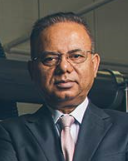
Syed Ahmed, Ph.D.
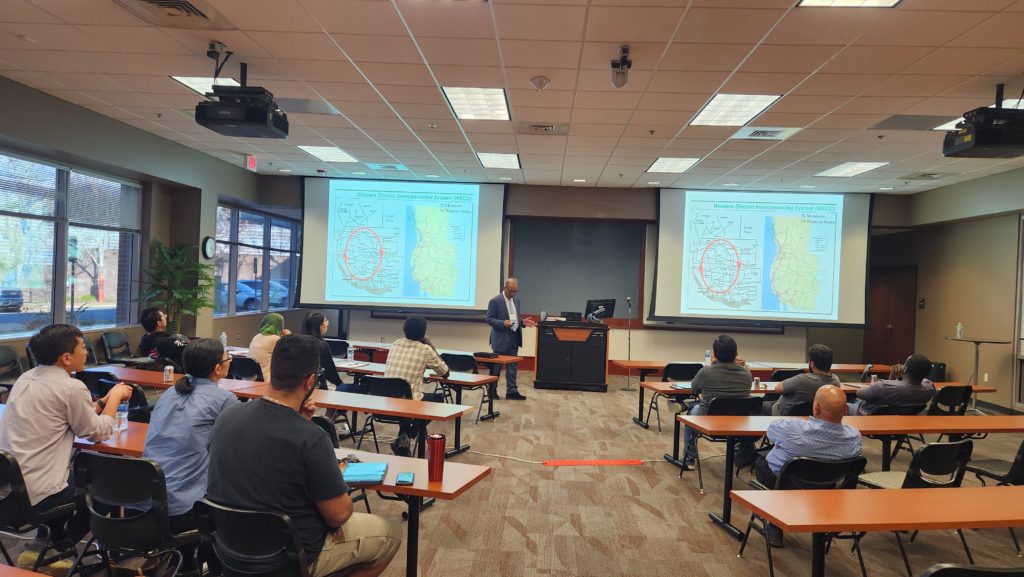
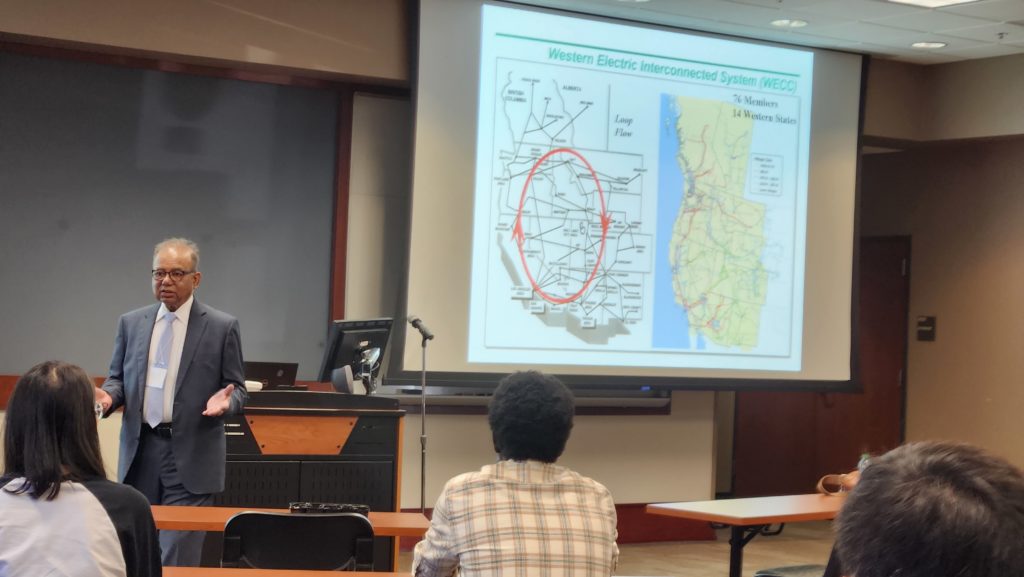
=============================================
IEEE PES Chapter Student Focused Event
Event: Conversations with graduate students and advice on professional and career success by an IEEE Fellow and Member of the U.S. National Academy of Engineering
Time: 4 PM on January 26, 2023
Venue: Center for Advanced Power Systems, Research Foundation Building A, Seminar Room 120, 2000 Levy Avenue, Tallahassee, Florida 32310
Philip Krein, Ph.D.

Philip Krein has been working on electric and hybrid cars for more than 30 years. He works on high-performance motors, circuits and systems for chargers, and interconnections to the power grid. He is the Grainger Endowed Chair Professor Emeritus in Electric Machinery and Electromechanics at the University of Illinois at Urbana-Champaign and was the founding Executive Dean of the Zhejiang University/ University of Illinois at Urbana-Champaign Institute in China. His startup company, SolarBridge Technologies, Inc., developed long-life integrated inverters for solar energy. He holds 42 U.S. patents and is a past President of the IEEE Power Electronics Society and a past Chair of the IEEE Transportation Electrification Community. He is a Fellow of the IEEE, a Fellow of the U.S. National Academy of Inventors, and a member of the U.S. National Academy of Engineering. He received IEEE William E. Newell Award in 2003 and the IEEE Transportation Technologies Award in 2021.
=============================================
Time: 3 PM on January 26, 2023
Venue: Center for Advanced Power Systems, Research Foundation Building A, Seminar Room 120, 2000 Levy Avenue, Tallahassee, Florida 32310
Title: Rethinking massive electric car charging infrastructure from the user side:
The 90% energy challenge
Abstract
The shift to more-electric cars and transportation brings opportunities for control, extreme performance, energy reduction and flexibility, cheaper operation, and lower emissions. Customers see limited range, battery performance limits, slow refueling, and lack of charging facilities as big drawbacks. This presentation shows how to simplify infrastructure requirements, based on actual usage data. The energy needs of electric and plug-in hybrid passenger cars can be met with conventional single-phase electrical outlets. Safety protection, metering, billing, and other functions can be supported by a car to turn a “dumb” electrical outlet into a smart vehicle charge point. Actual driver needs are discussed, showing how more advanced chargers fit in and why “slow charging” is a fallacy most of the time. Flexibility supported within a vehicle can minimize carbon impact and enhance environmental benefits. The talk explores how to think differently about electric cars, energy, and how infrastructure interaction can work.
Presenter: Philip Krein, Ph.D.

Philip Krein has been working on electric and hybrid cars for more than 30 years. He works on high-performance motors, circuits and systems for chargers, and interconnections to the power grid. He is the Grainger Endowed Chair Professor Emeritus in Electric Machinery and Electromechanics at the University of Illinois at Urbana-Champaign and was the founding Executive Dean of the Zhejiang University/ University of Illinois at Urbana-Champaign Institute in China. His startup company, SolarBridge Technologies, Inc., developed long-life integrated inverters for solar energy. He holds 42 U.S. patents and is a past President of the IEEE Power Electronics Society and a past Chair of the IEEE Transportation Electrification Community. He is a Fellow of the IEEE, a Fellow of the U.S. National Academy of Inventors, and a member of the U.S. National Academy of Engineering. He received IEEE William E. Newell Award in 2003 and the IEEE Transportation Technologies Award in 2021.
=================================
LASERS IN SENSING, COMMUNICATIONS, AND MEASUREMENT
Abstract
Advances in lasers have been extraordinary with progress in virtually every important characteristic such as power output, cost, size, and efficiency. Operating wavelengths are now available from beyond ultraviolet to the far infrared. They continue to integrate into our lives with continuous development of new applications. I’ll talk about applications of lasers in sensing, communications, and measurement and tell the story and learnings behind the development of the first mass-produced laser mouse.
Date and Time
Date: 11 Jan 2023
Time: 03:30 PM to 04:30 PM
All times are (UTC-05:00) Eastern Time (US & Canada)
Location
2000 Levy Ave. BLDG A
Tallahassee, Florida
United States 32310
Room Number: Seminar Room 120
Hosts
Tallahassee Area Section Chapter,PE31
Co-sponsored by Florida A&M University and Florida State University ECE department
Speakers
Dr. Baney of Keysight Technologies
